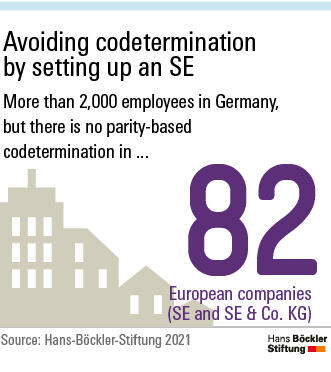Codetermination: Employees need a strong voice
Codetermination is firmly established throughout Europe: there are national regulations entitling employees to a say in their company’s management bodies in 18 of the 27 EU member states. In order to preserve this codetermination culture it is necessary, according to an analysis by IMU, both to implement European minimum standards and to close loopholes in national law.
According to the experts, company statutes are increasingly being determined by the EU. In the past this has not always been positive: the European Court of Justice has ‘opened the door to regime shopping, with fatal consequences for codetermination.’ For example, in Germany at least 62 companies with more than 2,000 employees have opted for a foreign legal form – such as B.V. & Co. KG – and thus are not subject to codetermination legislation.
Also open to abuse, the analysis shows, is the European Company (SE). In the case of transformation into this legal form, although existing codetermination is grandfathered, the level remains ‘frozen’, even if the workforce subsequently increases. Companies that adopt the SE legal form when they are on the brink of reaching the threshold for one-third or parity-based codetermination can thus completely circumvent codetermination in the supervisory board or permanently enshrine a weaker form of it. There are now at least 82 companies in Germany in which setting up an SE has been used to forestall parity-based codetermination. The national legislature could also be more active in this regard, supplementing the law transposing the Directive into German law – the SE-Beteiligungsgesetz – with a right to renegotiate with a new statutory fallback solution if the size of the workforce changes.
The experts point out that a new European directive on cross-border transformation, merger or division of companies was adopted at the end of 2019. It provides that, in the event of a change of legal form, there must be negotiations on codetermination if four-fifths of the relevant threshold has been reached. But because the statutory fallback solution still only ensures the status quo, employees have no real bargaining power in this case. Furthermore, with regard to codetermination grandfathering remains valid for only four years. After that, it is possible to eliminate employees‘ voice completely through a further change of legal form. In this instance the leeway provided for in national transpositions to protect codetermination has to be utilised.
The authors conclude that current law is ‘utterly inadequate for protecting codetermination properly’. A general framework directive is needed on information, consultation and codetermination at European level that takes effect when companies resort to European directives to change their statutes. In addition, the directive should stipulate negotiations on a ‘European company body’, regardless of whether the provisions of the directive on European Works Councils have been met. Also, minimum standards on company codetermination are necessary that also take workforce size into account: above 50 employees two or three seats on the supervisory board should be allocated to the workers’ side, from 250 employees one-third of the seats and in companies with more than 1,000 half of the seats. Besides that, effective sanctions are needed to deal with employers’ violations of European Works Councils’ information and consultation rights, as well as ensure a right to trade union participation.
The experts recommend that the German legislature adopt a law on the extension of codetermination that expands the scope of application of the codetermination laws to companies with foreign legal forms. It is also necessary to close loopholes in the One-third Participation Act, which hitherto has not applied to the legal form GmbH & Co. KG.
Daniel Seikel u.a.: #zukunftsozialeseuropa: Das Europäische Wirtschafts- und Sozialmodell stärken (pdf), HBS-Report Nr. 67, April 2021




